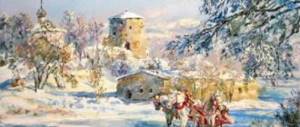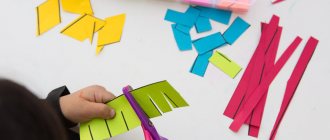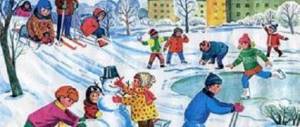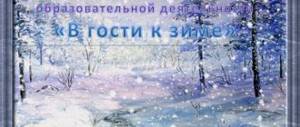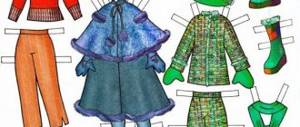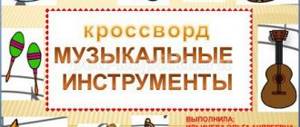Summary of a frontal speech therapy lesson in a preparatory group on the lexical topic “Winter”
Integrated lesson on familiarization with the environment and the formation of lexical and grammatical categories on the topic “Winter”
Author: Durneva Marina Alekseevna, speech therapist teacher, MBDOU kindergarten No. 17, Kamensk-Shakhtinsky. Description: This lesson was conducted in a preparatory speech therapy group. When preparing the lesson, the emphasis was on the lexical topic “Winter”. This lesson will be useful for speech therapists and preschool teachers. Goal: generalization and systematization of children’s knowledge on the topic “Winter”. Objectives: Correctional and educational:
• improve word formation skills;
• improve the grammatical structure of speech - agreement of numerals with nouns in indirect cases; • improve phonemic representations - drawing up a sound diagram of a word; • improve reading skills and the ability to form words from letters; • improve children's coherent speech. Correctional and developmental:
• develop general speech skills, prosodic side of speech, voice strength;
• automate the correct pronunciation of given sounds; • exercise children in the formation of verbs in the past tense form; • form the ability to listen, develop auditory attention; • develop attention, memory, visual-figurative and verbal-logical thinking. Correctional and educational:
• cultivate in children the ability to listen carefully to the speech of the teacher and other children.
Contents
Speech therapist: Guys, look how many guests we have today. Let's say hello to everyone. Logorhythmic exercise “Legs walked.” Slide No. 1 “Forest School” appears on the board. Speech therapist: Look, the forest inhabitants came to visit us and invite you and me to visit them. Not just to visit, but where? Read it. Children read "Forest School". Speech therapist: Well, should we go to forest school? Children: Yes. Slide No. 2 appears. Speech therapist: Auntie Owl brought letters to class. Help the animals name them. Children name the letters on the slide. Speech therapist: What word can be made from these letters? Children: Winter. Speech therapist: What is the 1st letter? Children: Z (slide number 3) Speech therapist: What is the 2nd letter? Children: And (slide number 4) Speech therapist: What is the 3rd letter? Children: M (slide number 5) Speech therapist: What is the 4th letter? Children: A (slide number 6) Speech therapist: Read what we got. Children read “Winter” Speech therapist: Guys, guess Auntie Owl’s riddle! Slide number 7.
What kind of ridiculous person is this?
Carrot nose, broom in hand, Afraid of the sun and heat? (snowman) Slide No. 8. The speech therapist shows a set of the “Sound Snowmen” manual. Speech therapist: Here are my friends, the Snowmen, in multi-colored hats and scarves. These guys are not simple, they are magical - sound. Try to guess - what sound does this snowman mean? Children explain that a snowman in red means a vowel sound, in blue a hard consonant sound, and in green a soft consonant sound. Speech therapist: Well done, guys! Let’s make up the word “WINTER” from our Sound Snowmen. Children conduct a sound analysis of the word, give a description of each sound in the word, and display the corresponding snowman. Speech therapist: Guys, what has winter brought us? (cold, frost, snow, ice)
- What lies on the ground in winter?
(Snow covered earth)
.
- What can you say about the snow lying on the ground? What is he like? Start with the word “snow” (snow is white, fluffy, cold, shiny)
.
Slide No. 9. Speech therapist: Look, Aunt Owl has a new task for us. Let's read it. Children read “Write a story about winter.” Speech therapist: Let's help the animals. Slide number 10. Children compose a story using a mnemonic table:
Winter has come.
There are dark clouds in the sky and fluffy snow is falling on the ground. Everything around was covered with white snow. Girls and boys are walking on the street. They feed the birds grain, seeds and bread in winter. Slide number 11. Children use a mnemonic table to compose a story:
Winter has come.
Fluffy snow is falling. Many birds flew to warmer climes. But titmouses, sparrows, crows, bullfinches, crossbills, and pigeons stayed with us for the winter. Everything around was covered with white snow. Therefore, birds have nothing to eat in winter. And people pour seeds, grain and bread crumbs into their feeders. Slide number 12. Children compose a story using a mnemonic table:
Winter has come.
Everything around was covered with white snow. Frost draws patterns on the windows. Girls and boys wear warm clothes in winter. Soon we will decorate the Christmas tree and Santa Claus and the Snow Maiden will bring us gifts for the holiday. Speech therapist: Well done, you told the animals a lot about winter. And to find out even more about her, let’s go with you to visit Zimushka-winter. Back massage “Steam Locomotive” Children stand one after another like a “train”.
The locomotive shouts: “Doo-doo!
I'm going, I'm going, I'm going! (pumping with fists)
And the carriages knock, and the carriages say: “Well, well, well!
So so so! So so so! So so so!" (patting palms) Speech therapist: The locomotive is moving, moving, two pipes and a hundred wheels. Slide number 13. Logorhythmic exercise “Funny Little Engine”. Slide number 14. Speech therapist: Here we are. Let's read the name of our first station. Children: Snezhnaya station. Game “Family of Words” Speech therapist: Let’s form a family of words from the word “snow.” — When it snows heavily, what do we call it? (snowfall)
.
- How can you call snow affectionately? (snowball)
.
-Who are we making out of snow? (Snowman)
.
— What will the park be like if it is covered with snow? (snowy)
.
- What kind of snow ball? (snow)
.
Game “Yes - no” The speech therapist places a stack of cards with pictures of different numbers of snowflakes on the carpet, pictures down. Speech therapist: Take 1 card, look at it and tell me how many snowflakes are drawn on it. Your neighbor says that he does not have that many snowflakes, but he has another number, and so on. 1 child: I have 2 snowflakes. Child 2: I don’t have two snowflakes, but I have five snowflakes. Child 3: I don’t have five snowflakes, but I do have three snowflakes. Child 4: I don’t have three snowflakes, but I do have six snowflakes. Etc. Slide No. 15. Speech therapist: A steam locomotive is moving, riding, Two pipes and a hundred wheels. Logorhythmic exercise “Funny little train”. Slide number 16. Speech therapist: Here we are. Let's read the name of our second station. Children: Vyuzhnaya station Who howled in the chimney? Who opened the gate? Who is there howling, howling, sweeping away all the paths? Who throws snow in your face, sweeps it onto the porch? (blizzard) Slide number 17. Speech therapist: This picture is called “Blizzard”. How can you call a blizzard differently? What is a blizzard? Children: blizzard, blizzard, strong wind with snow. Speech therapist: Let's play the game "Blizzard". You will sing the sound “U” then quietly. It’s loud depending on whether I raise or lower my hand. The higher my hand is, the louder you should sing, and vice versa. Game "Blizzard" Speech therapist: Let's play blizzard with you. You will speak like a blizzard - “U” - sometimes loudly, sometimes quietly, depending on how I raise my hand. If I raise my hand up, then you speak loudly, and if down, then you speak quietly. Speech therapist: The blizzard brought a lot of snow. Game "What yesterday?" — Guys, I know a lot about snow and what can happen to it. I will tell you what is happening with the snow now, and you must answer me as if it happened yesterday. - Today the snow shines, but yesterday the snow sparkled. “It’s snowing today, but it was falling yesterday.” - Today the snow sparkles, but yesterday it sparkled. - Today the snow is melting, but yesterday it was melting. - Today the snow crunches, but yesterday it crunched. - It’s snowing today, but it was snowing yesterday. Speech therapist: The locomotive is moving, moving, two pipes and a hundred wheels. Slide number 18. Logorhythmic exercise “Funny Little Engine”. Slide number 19. Speech therapist: Here we are. Let's read the name of our third station. Children: Station “Winter” Game “Winter Words” Speech therapist: And now we will play the game “Winter Words”. I will name the words, you clap your hands if you hear a word related to winter. — Snowflake, warmth, New Year, sled, ice, heat, mittens, tulips, snowman, Santa Claus, falling leaves, Snow Maiden, peaches, sunbathing, snowfall, skis. Well done! You were very attentive. Slide number 20. Game “Correct the mistake” Today the animals made up stories about winter with Aunt Owl, but they got everything mixed up. Help Aunt Owl correct the mistakes. — The first winter month is called September. As winter comes, the cold begins, and people immediately put on warm clothes: fur coats, boots, mittens, hats, shorts, scarves. — In winter, children go sledding, skiing, biking, making a snow woman, swimming in the sea, sliding on ice, sunbathing, building a snow fort and preparing for the holiday - Mother's Day. — There are athletes who engage in winter sports: hockey players hit the puck into the goal with their sticks; figure skaters dance on skis; skiers slide down the hill on sleds; Skaters run on skis. — To avoid catching a cold, you need to eat one icicle every morning. Well done, you fixed all the mistakes. Speech therapist: The locomotive is moving, moving, two pipes and a hundred wheels. Slide number 21. Logorhythmic exercise “Funny Little Engine”. Slide number 22. Speech therapist: Here we are. Let's read the name of our fourth station. Children: Station “New Year” Guess another riddle, guys. It's snowing outside, so it's a holiday... (New Year) Slide No. 23. Game “Pick up a sign” Speech therapist: Let's play the game “Pick up a sign” with you. You need to select as many signs as possible for the word “holiday”. Holiday (What?) – fun, family, winter, joyful, etc. Well done! Here's another riddle for you. I come with gifts, I sparkle with bright lights, I’m elegant, funny, I’m in charge for the New Year! (Christmas tree) Slide number 24. Game “Family of Words” Speech therapist: Let's try to remember words from the same family with this word. What do you call a small Christmas tree? (Christmas tree)
What is the name of the forest in which Christmas trees grow?
(spruce forest)
What kind of cones does the tree have?
(spruce)
What is a large Christmas tree called?
(spruce)
Well done!
Game “Dress up the Christmas tree” I suggest you decorate the Christmas tree. (An artificial Christmas tree is displayed)
.
To decorate the Christmas tree you need to win a Christmas tree toy. And the one who can tell me a winter sign or tell me a proverb or saying about winter will win. Children say a sign, a proverb, a saying about winter, take a Christmas tree decoration and hang it on the tree. Speech therapist: So our Christmas tree is decorated. What is customary to do around the Christmas tree? Children: Dance in a circle, play different games. Speech therapist: Let’s play the game “Christmas Trees and Stumps.” Slide number 25. Musical game around the Christmas tree “Fir-trees-stumps”. Slide number 26. Speech therapist: Guys, while we were playing, someone sent us a letter. Read who it's from. Children: Letter from Santa Claus. Speech therapist: Let me help you read it. Well, guys, we surprised you. It was not in vain that they taught you! You have shown perseverance, patience, diligence, as well as diligence and good upbringing. I have prepared gifts for you, find them under your bright Christmas tree! Children, together with a speech therapist, look for gifts under the tree.
Presentation on the topic: Winter
We recommend watching:
Summary of GCD in a compensatory preparatory group with severe speech impairments Synopsis of an integrated lesson in a preparatory group with general underdevelopment of speech of the third level Synopsis of GCD in a preparatory group on the topic: Pisces Summary of GCD on speech development on the topic: Winter in a preparatory speech therapy group
Similar articles:
Lesson summary – travel on the topic “School” in the preparatory group
Summary of the lesson “Take care of nature” in the preparatory group
Walks in the preparatory group. Card file with goals for December
Walks in the preparatory group. Card file with goals for January
Walks in the preparatory group. Card file with goals for February
